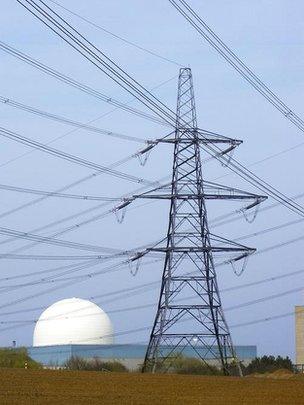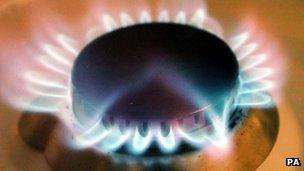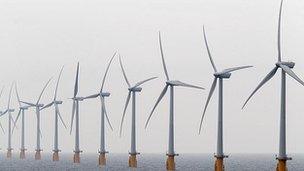Greens' concern for draft energy bill
- Published

Ministers want some new-nuclear in the mix
Environmentalists now fear that the UK government's draft energy bill to be published on Tuesday will end in a new "dash for gas".
They want the bill to be guided by the government's stated wish to almost completely de-carbonise the electricity industry by the 2030s.
But there has been no guarantee such a target will be enshrined in the bill.
The environmentalists say ministers' problems with new nuclear power will leave the UK gas-dependent for decades.
The UK could buy emissions permits on the European market to keep to its medium-term emissions reductions targets.
But a failure to de-carbonise electricity would divert the Britain from its course to cut CO2 by 80% by 2050 - unless the gas-fired power stations were made to run with carbon capture and storage, a technology that is unproven on a large scale.
Up front
Tuesday's document has been awaited since last year. The Electricity Market Reform (EMR) it proposes was designed to bring a greater element of planning into the energy market to guarantee a clean mix of electricity supplies - particularly nuclear power.
The government will introduce long-term price contracts to provide reassurance for investors in nuclear and offshore wind farms, which need huge up-front expenditure but then run relatively cheaply when they are built.
At the moment, it is illegal for an EU state to subsidise nuclear power and the EMR contracts are seen as a way round that.
The long-term contracts are likely to be negotiated in the first place on a scheme-by-scheme basis, probably between the generators and the National Grid. In later phases, firms will bid for contracts in auctions.
The extra cost of guaranteeing clean power will come from a levy on people's bills, although it is not clear yet how large the Treasury will allow that levy to be.
As the fine technical details have been worked out, the government's over-arching energy plans have been blown off course by the failure to strike a deal with the nuclear power generators who, according to the Committee on Climate Change, should provide 40% of our electricity by 2030.
Nuclear option
Ministers are determined to have some nuclear new-build, even though following the withdrawal of the generators E.oN and RWE, it will clearly be far fewer than the eight stations previously envisaged. Some observers think only one station will eventually get built.
With EDF left as the only significant bidder for nuclear, the Treasury has been caught in protracted wrangling over the nuclear price - a process that is said to be dragging back the legislation. The legislative uncertainty, meanwhile, is deterring investors in renewables.

China's desire for more gas could put upward pressure on world prices
Tuesday's draft bill is not expected to contain details of the proposed long-term contracts.
"It's a shambles," Greenpeace director John Sauven told BBC News. "The most important question is: 'What is the objective of this bill?'
"If your objective is to have a low- or zero-emission electricity sector, you need to have a strategy and that needs to be clearly stated. But the government isn't clear about it. The longer this disarray in policy lasts, the more likely it is that we get another dash for gas which will break all our CO2 targets.
"On the one hand, the government is saying: 'We have the Climate Change Act and the Green Investment Bank', but the thing that really matters is being clear about what you are doing on renewable energy - and they're not clear about that. Their climate policy is all mouth and no trousers."
Carbon capture
The UK's leading green groups have written to Energy Secretary Ed Davey, urging him to introduce a bill which commits that by 2030 electricity should be produced for less than 50g of CO2 per kWh; equal support for demand reduction as well as new generation; and support for renewables that is predictable and simple (many in the industry are dismayed by the extreme complexity of the proposed contracts system).
I understand, though, that a scheme planned to reduce energy demand by incentivising energy saving - so-called NegaWatts - has been left out of Tuesday's document. I am told that it was technically too difficult to agree a baseline from which industries would make their proposed energy savings.
Frustration at the government's delay over the bill is widespread but not all environmentalists think a dash for gas is the worst possible outcome.
Bryony Worthington, a Labour peer who runs a green pressure group Sandbag, told BBC News: "I am not as bothered as some others about a new dash for gas because we need to replace coal much more urgently than we are.
"The way out is for gas power stations to be built in a way so they can be retrofitted to take hydrogen or emissions captured and stored."
The Environment Agency's chairman, Chris Smith, recently gave a reluctant endorsement to shale gas in the UK with the key proviso that it was fitted with CCS.
China price pressure
The Committee on Climate Change also foresees that by 2030 gas may still provide a substantial share of electricity, providing it's fitted with CCS from the outset.

Investors need some certainty if they are to make commitments on expensive installations
But whilst lobbyists have been urging the government to favour gas as a way of keeping prices affordable, the green groups point out that the big rises in gas bills are the overwhelming reason for high electricity bills.
They are not alone. Alistair Buchanan, chief executive of the regulator Ofgem, recently warned that the UK could face very high gas prices in future as China increasingly competed for gas on the world market.
To add to the confusion over energy policy - a state that has lasted nearly a decade - the government has also announced a consultation on the use of gas for electricity generation to run alongside its market reform legislation - even though critics say a decision on gas needs to come before any broader reform.
'Clarity required'
The draft bill is being introduced so the proposals can be scrutinised by parliament before appearing as a fully fledged bill in the Autumn.
The proposals will be put to the Energy and Climate Change Committee, whose chairman, Tim Yeo, told BBC News: "I fear there are going to be some very big holes in this draft bill.
"It really is vital that the government gives clarity to investors soon because tens of billions are needed, and renewables investors are being deterred by the ongoing uncertainty."
Mr Yeo said he favoured a more simple system of support for renewables and nuclear, and he re-iterated his call for the government to simply declare a subsidy for nuclear and then square it with Brussels.
He agreed that the draft bill should re-commit the government to its existing aspiration to de-carbonise electricity in the 2030s, although he also doubted that the promise would be delivered within the bill.
The 2030 plan was endorsed by the prime minister in November 2010 when the prospects for gas, nuclear and offshore wind power looked rather different from now.
- Published17 May 2012
- Published16 May 2012
- Published25 April 2012
- Published23 April 2012
- Published19 March 2012
- Published17 April 2012
- Published17 April 2012
- Published13 October 2011
- Published13 March 2012